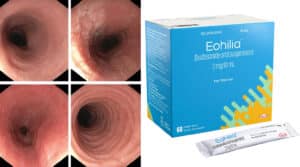In a flood of approvals in the last days of May the FDA green lighted a new ORAL therapy, Lumakras (sotorasib) from Amgen, three months ahead of schedule. Lumakras is the first treatment for adult patients with non-small cell lung cancer (NSCLC) with a genetic KRAS G12C mutation and have received at least one prior systemic therapy.
KRAS mutations account for approximately 25% of mutations in NSCLC with the G12C variant representing about 13%. Of the 2.2 million new lung cancer cases diagnosed each year globally, about 84% are of the NSCLC type.
Oncologists are very upbeat about this approval as there were no good therapy options for NSCLC patients with the mutation. Amgen is first to get a new therapy to the FDA finish line, but other companies are on well into late stage trials.
Analysts expressed some surprise at the of $17,900 price per month announced by Amgen. None the less, Lumakras is forecast to be a $1 billion drug somewhat quickly. That may be tempered by the FDA’s request to Amgen that they evaluate a significantly lower dose for the drug. If that happens, the forecast likely be revised.
We have confirmed that Lumakras will launch into Limited Distribution. Onco360 has been named as the specialty pharmacy selected by Amgen to dispense the product.
FDA Approves First Targeted Therapy for Lung Cancer Mutation Previously Considered Resistant to Drug Therapy
May 28, 2021 — Today, the U.S. Food and Drug Administration approved Lumakras (sotorasib) as the first treatment for adult patients with non-small cell lung cancer whose tumors have a specific type of genetic mutation called KRAS G12C and who have received at least one prior systemic therapy. This is the first approved targeted therapy for tumors with any KRAS mutation, which accounts for approximately 25% of mutations in non-small cell lung cancers. KRAS G12C mutations represent about 13% of mutations in non-small cell lung cancers.
“KRAS mutations have long been considered resistant to drug therapy, representing a true unmet need for patients with certain types of cancer,” said Richard Pazdur, M.D., director of the FDA’s Oncology Center of Excellence and acting director of the Office of Oncologic Diseases in the FDA’s Center for Drug Evaluation and Research. “Today’s approval represents a significant step towards a future where more patients will have a personalized treatment approach.”
Lung cancer, the most common cancer type with the highest mortality, can largely be categorized by the genetic mutations that cause it. KRAS is a type of mutation in a group of genes that help regulate cell growth and division.
Researchers evaluated the efficacy of Lumakras in a study of 124 patients with locally advanced or metastatic KRAS G12C-mutated non-small cell lung cancer with disease progression after receiving an immune checkpoint inhibitor and/or platinum-based chemotherapy. The major outcomes measured were objective response rate (proportion of patients whose tumor is destroyed or reduced) and duration of response. The objective response rate was 36% and 58% of those patients had a duration of response of six months or longer.
The approved 960 milligram dose is based on available clinical data, as well as pharmacokinetic and pharmacodynamic modeling that support the approved dose. As part of the evaluation for this accelerated approval, the agency is requiring a postmarketing trial to investigate whether a lower dose will have a similar clinical effect.
The most common side effects of Lumakras include diarrhea, musculoskeletal pain, nausea, fatigue, liver damage and cough. Lumakras should be withheld if patients develop symptoms of interstitial lung disease and permanently discontinued if interstitial lung disease is confirmed. Health care professionals should monitor a patient’s liver function tests prior to starting and when taking Lumakras. If a patient develops liver damage, Lumakras should be withheld, dose reduced or permanently discontinued. Patients should avoid taking acid-reducing agents, drugs that induce or are substrates for certain enzymes in the liver and drugs that are substrates of the P-glycoprotein while taking Lumakras.
Lumakras was approved using the Accelerated Approval pathway, under which the FDA may approve drugs for serious conditions where there is unmet medical need and a drug is shown to have certain effects that are reasonably likely to predict a clinical benefit to patients. Further study is required to verify and describe anticipated clinical benefits of Lumakras.
The FDA granted this application Fast Track, Priority Review and Breakthrough Therapy designations.
Lumakras also received Orphan Drug designation, which provides incentives to assist and encourage the development of drugs for rare diseases.
This review was conducted under Project Orbis, an initiative of the FDA Oncology Center of Excellence. Project Orbis provides a framework for concurrent submission and review of oncology drugs among international partners. For this review, FDA collaborated with the Australian Therapeutic Goods Administration (TGA), the Brazilian Health Regulatory Agency (ANVISA), Health Canada and Medicines and Healthcare products Regulatory Agency (MHRA; United Kingdom). The application reviews are ongoing at the other regulatory agencies.
The FDA granted approval of Lumakras to Amgen Inc.






